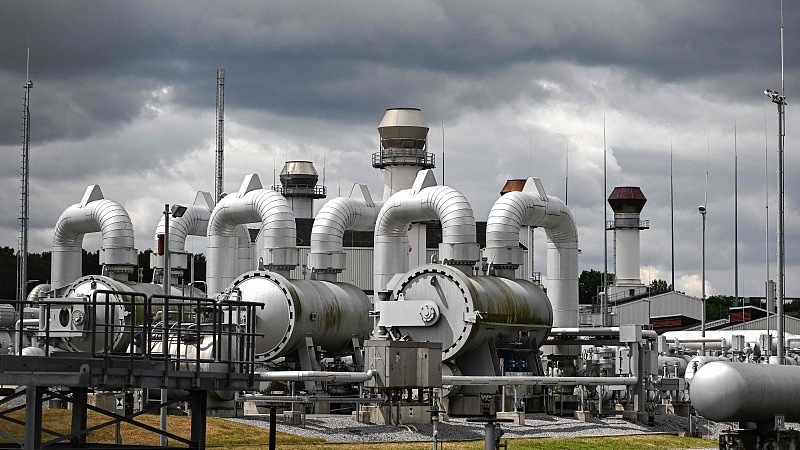
Pipes and pressure gauges for gas lines are pictured at Open Grid Europe (OGE), one of Europe's largest gas transmission system operators, in Werne, western Germany, July 15, 2022. /CFP
Pipes and pressure gauges for gas lines are pictured at Open Grid Europe (OGE), one of Europe's largest gas transmission system operators, in Werne, western Germany, July 15, 2022. /CFP
Nearly a year after Ukraine conflict, concerns over energy security still loom over Europe. Uncertainties linger on as the price caps for seaborne Russian refined oil products officially take effect on Sunday.
The price caps were agreed upon on Saturday by European Union (EU) countries, the Group of Seven (G7) and Australia, according to the European Commission press release. The prices are capped at $100 per barrel for more expensive products like diesel and gasoline, and $45 per barrel for discounted products like fuel oil.
The price caps aim to "keep on turning up the pressure" further on Russia, said European Commission president Ursula von der Leyen in a statement on February 2, 2023.
Concerns over the price cap
The newest price caps represent that the EU is taking a further step toward cutting its energy ties with Russia. As gas is mainly used for power generation, household heating and industrial productions, the move also brings risks as gas prices have already soared since February 24, 2022 with reduced gas deliveries from Russia.
The price cap on Russian oil products will bring negative effects to European countries and lead to a sharp rise in international and regional oil prices, said Xu Qinhua, the executive dean of Eurasian Research Institute under Renmin University of China.
Xu noted that the price cap will exacerbate the energy crisis and bring up the living cost for European residents, as well as interfering the functioning of the market mechanism.
In the past year, the interruption of Russian oil supply to the global market has already driven up energy prices and inflation for consumers, causing a drop in their purchasing power.
"The move will also lead to a new round of countermeasures by Russian, which in turn aggravate the regional tensions and energy market turbulence," Xu told CGTN.
Russia warned on Friday of a further imbalance in global energy markets. The country is taking measures to "hedge their interests against the risks associated," according to Kremlin spokesman Dmitry Peskov.
The price cap is inconsequential, said Vandana Hari, founder of a Singapore-based company that provides analysis on the global energy markets, who expressed her skepticism during an interview with CNBC. She noted that Russian oil will find its way into the markets with customers that will buy the oil at discounts.
On the other hand, Europe will find new suppliers for energy sources and diversify its energy mix.

Cars and trucks drive on a highway in Frankfurt, Germany, January 27, 2023. /AP
Cars and trucks drive on a highway in Frankfurt, Germany, January 27, 2023. /AP
The lingering effects
European countries were undergoing energy price volatility over the summer months. Back in June 2022, German Minister Robert Habeck warned that if as crisis continues, there would be "catastrophic" shutdowns in industries, which will lead to mass unemployment.
Meanwhile, the high costs of energy pushes up inflation and that makes life harder for local residents.
More people will be affected by gas shortages and high prices as the cost is gradually passed down to consumers, said Habeck during an interview with local media.
Germany bears the brunt of the energy crisis due to its high reliance on energy exports from Russia. The country has decided to replace all energy imports from Russia by as soon as mid-2024.
Other European countries also counteract soaring energy prices and national inflation. In France, several main nuclear reactors were under maintenance last year as Europe struggled to deal with cuts in Russian natural gas supplies used for generating electricity.
In Greece, inflation ran at over eight percent in December 2022. The price of wood in Greece rose steeply as demand for burning wood for heating surged. Loggers in Greece said they tried to keep up with the rising demand for wood, which is considered a more affordable choice for people to heat their homes with the increased petrol and gas bills.
The tight supply-demand balances in the energy market have driven up the energy prices in Europe, particularly for natural gas, according to Bruegel, a Brussels-based independent European think tank that provides analysis to policymakers in the EU.
The European countries have banned the purchase and import of sea-borne Russian crude oil since December 2022, followed by a price cap on Russian oil at $60 per barrel, which is applied to seaborne crude oil and petroleum oils.